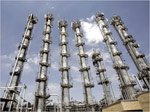 AFP: Iran said on Tuesday it will open its atomic sites to some world powers, in a rare move swiftly dismissed as “antics’ by the United States, which along with Britain, France and Germany, is not invited.
AFP: Iran said on Tuesday it will open its atomic sites to some world powers, in a rare move swiftly dismissed as “antics’ by the United States, which along with Britain, France and Germany, is not invited.
By Jay Deshmukh
 TEHRAN (AFP) — Iran said on Tuesday it will open its atomic sites to some world powers, in a rare move swiftly dismissed as “antics’ by the United States, which along with Britain, France and Germany, is not invited.
TEHRAN (AFP) — Iran said on Tuesday it will open its atomic sites to some world powers, in a rare move swiftly dismissed as “antics’ by the United States, which along with Britain, France and Germany, is not invited.
Foreign ministry spokesman Ramin Mehmanparast said invitations to visit Iran’s nuclear sites in Natanz and Arak have been sent to ambassadors of some of the nations represented in the International Atomic Energy Agency (IAEA).
Diplomatic sources at the IAEA, the UN nuclear watchdog in Vienna, said that invitations had gone out to Russia, China, Egypt and Cuba as well as to Hungary as rotating president of the European Union.
However, the sources said the United States, Britain, France and Germany were not on the list.
The unusual move to open up its facilities comes as Tehran works to garner support for its atomic drive in the run-up to talks with the six world powers in Turkey at the end of January.
“The representatives of some European Union countries, NAM (Non-Aligned Movement) and some representatives of the five-plus-one (six world powers) have been invited to visit our nuclear sites,” Mehmanparast told a news conference.
When asked whether the United States was invited for the trip, he said “the list of the countries invited …. will be unveiled when it is finalised.”
The US State Department in Washington reacted to the announcement by saying the planned tour amounted to mere “antics” and was no substitute for cooperation with the UN watchdog.
“We’ve seen these antics by Iran before,” State Department spokesman Philip Crowley told AFP, adding “it is an attempt to distract from its failure to live up to its obligations to the IAEA.”
Mehmanparast told reporters in Tehran the initiative was part of Iran’s attempt to cooperate with the IAEA and showed “the goodwill of our country and the peaceful and cooperative nature of our (nuclear) activities.”
ISNA news agency cited Iran’s envoy to the IAEA, Ali Asgar Soltanieh, as saying the visit was scheduled for January 15-16 and would be to the country’s main uranium enrichment plant at Natanz and the heavy water facility at Arak.
Such visits to Iran’s atomic facilities are rare and the last trip which Tehran arranged for members of the IAEA dates back to February 2007.
The proposed new visit to the nuclear facilities in central Iran, Mehmanparast said, is to “take place before the Istanbul meeting,” for which a final date has yet to be fixed.
Iran and Britain, China, France, Russia, the United States and Germany are to meet for another round of talks on Tehran’s atomic programme. The previous round of talks, after a 14-month hiatus, was held in Geneva on December 6-7.
The talks are aimed at ascertaining whether Iran is seeking nuclear weapons or is indeed looking only to meet the energy needs of its growing population, as it insists.
Ahmadinejad was adamant on Tuesday that the West had made a mistake by confronting Iran over its atomic programme.
“You should accept that you have made mistakes. You should accept that you chose the wrong path,” the hardliner said in a speech in his hometown of Semnan that was broadcast live on state television.
The “previous path (of confronting Tehran) will have no result but defeat,” the president said.
According to a US diplomatic cable made available by WikiLeaks on Tuesday, Ahmadinejad faces pressure at home against a nuclear fuel exchange deal with the world powers.
Turkey’s Foreign Minister Ahmet Davutoglu, in a meeting with a senior US envoy, said Ahmadinejad was facing “serious domestic problems inside Iran,” in the November 2009 cable on the whistle-blowing website.
He was quoted as saying that Turkish officials “actually see Ahmadinejad as ‘more flexible’ than others who are inside the Iranian government.”
The president was up against “huge pressure” because a nuclear exchange deal which has been on the table for more than a year would be “interpreted by some circles in Iran as a virtual defeat.”
The United States has not ruled out a military strike to stop Iran’s growing nuclear programme under Ahmadinejad, and Tehran has been slapped with four sets of UN sanctions.


